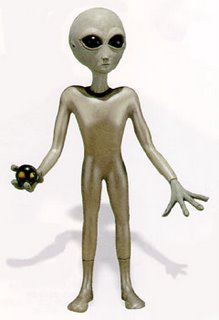 One tenth of stars may support life.
One tenth of stars may support life.
From New Scientist.
One tenth of the stars in our galaxy might provide the right conditions to support complex life, according to a new analysis by Australian researchers. And most of these stars are on average one billion years older than the Sun, allowing much more time, in theory, for any life to evolve. The concept of a "galactic habitable zone" (GHZ) for the Milky Way was first proposed in 2001. Now Charles Lineweaver of the University of New South Wales and colleagues have defined a life-friendly GHZ using a detailed model of the evolution of the Milky Way to map the distribution in space and time of four major factors thought essential for complex life.
"We're looking at what we think are the most robust and conservative pre-requisites for life - but they are very, very basic," Lineweaver says. The researchers conclude that a ring-shaped habitable zone emerged about eight billion years ago, roughly 25,000 light years from the core of the Milky Way. The zone has expanded slowly and includes stars born up to about four billion years ago. It encompasses close to ten per cent of all stars ever born in this galaxy. But other researchers say that too little is known about the prerequisites for life for this kind of mapping to have a great deal of meaning. "We hardly understand the origin of life, let alone the evolution of complex life. Until we do, it is extraordinarily difficult to talk about habitable zones," Mario Livio of the Space Telescope Science Institute in Maryland, US, told Science.
Lineweaver stresses that his team is not arguing that complex extra-terrestrial life is probable, or even exists, within their GHZ. "What we're saying is that this is the region that has the most potential for the formation of complex life," he says. The first factor the team considered in mapping the GHZ was the presence of host stars for a solar system. The second was the presence of sufficient heavy elements to form terrestrial planets. The third was a sufficiently safe distance from exploding supernovae. And the fourth was enough time for biological evolution. The team set this figure at a minimum of four billion years, since this was the amount of time it took for complex life to emerge on Earth.
[This was quite an old article but I thought it was worth posting. I think it shows that we are increasingly unlikely to be alone in the Galaxy.]

4 comments:
I have no doubt that there is other life in the universe - even highly evolved intelligent life. Maybe even more so than us. It is pretty arrogant to think that we are it, the one and only or even the most advanced. There is way too much out there than we can even conceive. Even at atronomical (sorry!) odds, with the infinite nature of space, extraterrestrial life is a pretty good bet.
I even think that one day we (or some other life form) will be able to manipulate the space time continuum to make long distance space travel a reality. It is theoretically possible. With all the advancement in science in just the last 100 years, it may come sooner rather than later - though certainly not within my lifetime.
~Mike
Word Verification: altakalb. That's gotta mean something!
For me life in the Galaxy is pretty much a no-brainer. I'd be VERY (and I do mean VERY) surprised if we didn't trip over it in just about every System we explored.
I'm actually more interested in the impact of such discoveries on our culture back here (being educated in Sociology, Philosophy & Religion).
I agree on the FTL (Faster Than Light) thing... Sub-light speed is just FAR too slow to get around much. We need SPEED.
I sometimes think that word verification is actually a language... Somewhere...
I agree with you both, it just makes no sense at all that this little speck that we call earth is the only inhabited planet anywhere. This links in so well with the ridiculous creationist agenda, for goodness sake most people on this planet don't think the Christian God created the world in 6 days about 6000 years ago, fancy imagining that living beings millions of light years away were created by him too. Its just possible that they have their own belief systems!
I can't help but wonder what the impact will be of highly intelligent and more advanced aliens either having a completely different religion - or none at all. I also wonder what they will think of us. Will they think we are too primitive to trade with or even talk too when they begin to understand our religions... or maybe they'll just send us their 'anthropologists'....
Post a Comment